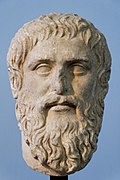Plato
Plato (428/427 or 424/423 – 348/347 BC) was an ancient Greek philosopher who was the student of Socrates and the teacher of Aristotle. His work is fundamental to Western philosophy and science. Plato's most famous work is the Republic, which details a wise society run by a philosopher.
Life[edit]
Plato was born to an aristocratic family in Athens. His father, Ariston, was believed to be descended from the early kings of Athens. Perictione, his mother, was related to the 6th century BC lawmaker Solon.
Works[edit]
Plato's dialogues have been used to teach a range of subjects, including philosophy, logic, ethics, rhetoric, and mathematics. His lasting themes include Platonic love, the theory of forms, the five regimes, innate knowledge, among others.
Philosophy[edit]
Plato's philosophy is a direct response to the unsettling period of the Peloponnesian War. His works reflect his philosophy of the world, knowledge, and the human condition.
Theory of Forms[edit]
Plato's Theory of Forms asserts that non-physical forms represent the most accurate reality.
Platonic Love[edit]
Platonic love is a type of love that is non-sexual.
Legacy[edit]
Plato's work has been influential in the development of philosophy, most notably in the works of his student, Aristotle.
See also[edit]
References[edit]
<references />
External links[edit]
- Plato's Works - Online versions of Plato's works.
|
|
|
-
Plato
-
Plato
-
Plato
-
Plato
-
Plato
-
Plato
-
Plato
-
Plato
-
Plato
-
Plato
-
Plato
-
Plato
Ad. Transform your life with W8MD's Budget GLP-1 injections from $75


W8MD offers a medical weight loss program to lose weight in Philadelphia. Our physician-supervised medical weight loss provides:
- Weight loss injections in NYC (generic and brand names):
- Zepbound / Mounjaro, Wegovy / Ozempic, Saxenda
- Most insurances accepted or discounted self-pay rates. We will obtain insurance prior authorizations if needed.
- Generic GLP1 weight loss injections from $75 for the starting dose.
- Also offer prescription weight loss medications including Phentermine, Qsymia, Diethylpropion, Contrave etc.
NYC weight loss doctor appointmentsNYC weight loss doctor appointments
Start your NYC weight loss journey today at our NYC medical weight loss and Philadelphia medical weight loss clinics.
- Call 718-946-5500 to lose weight in NYC or for medical weight loss in Philadelphia 215-676-2334.
- Tags:NYC medical weight loss, Philadelphia lose weight Zepbound NYC, Budget GLP1 weight loss injections, Wegovy Philadelphia, Wegovy NYC, Philadelphia medical weight loss, Brookly weight loss and Wegovy NYC
|
WikiMD's Wellness Encyclopedia |
| Let Food Be Thy Medicine Medicine Thy Food - Hippocrates |
Medical Disclaimer: WikiMD is not a substitute for professional medical advice. The information on WikiMD is provided as an information resource only, may be incorrect, outdated or misleading, and is not to be used or relied on for any diagnostic or treatment purposes. Please consult your health care provider before making any healthcare decisions or for guidance about a specific medical condition. WikiMD expressly disclaims responsibility, and shall have no liability, for any damages, loss, injury, or liability whatsoever suffered as a result of your reliance on the information contained in this site. By visiting this site you agree to the foregoing terms and conditions, which may from time to time be changed or supplemented by WikiMD. If you do not agree to the foregoing terms and conditions, you should not enter or use this site. See full disclaimer.
Credits:Most images are courtesy of Wikimedia commons, and templates, categories Wikipedia, licensed under CC BY SA or similar.
Translate this page: - East Asian
中文,
日本,
한국어,
South Asian
हिन्दी,
தமிழ்,
తెలుగు,
Urdu,
ಕನ್ನಡ,
Southeast Asian
Indonesian,
Vietnamese,
Thai,
မြန်မာဘာသာ,
বাংলা
European
español,
Deutsch,
français,
Greek,
português do Brasil,
polski,
română,
русский,
Nederlands,
norsk,
svenska,
suomi,
Italian
Middle Eastern & African
عربى,
Turkish,
Persian,
Hebrew,
Afrikaans,
isiZulu,
Kiswahili,
Other
Bulgarian,
Hungarian,
Czech,
Swedish,
മലയാളം,
मराठी,
ਪੰਜਾਬੀ,
ગુજરાતી,
Portuguese,
Ukrainian





